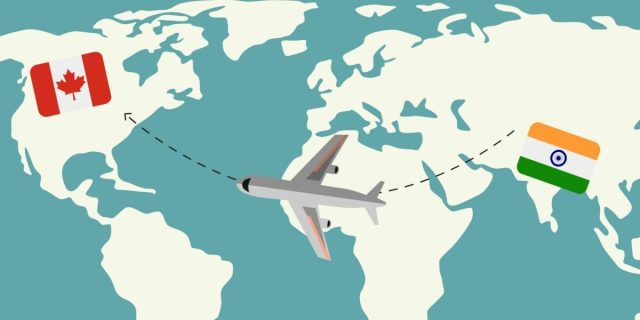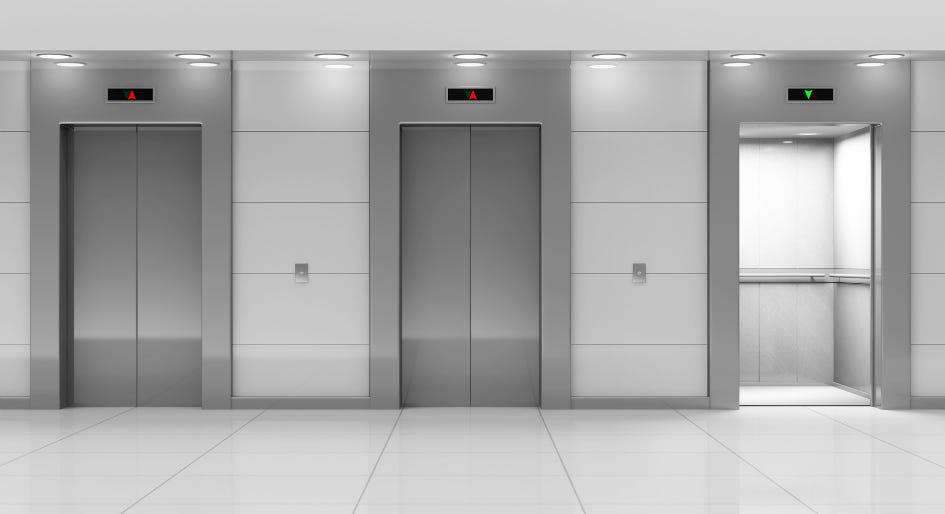Empathy Won't Save Us
An elevator ride reminded me of structural barriers to change, and the "free world"
Developed vs. Developing
Born in India, my family immigrated to Canada when I was just 10 months old. Having grown up here and frequently visiting India throughout my life, I’ve learned to appreciate the uniqueness of both countries, and their respective cultural differences.
Over the years, I’ve asked family and friends in the South Asian community what attracted them to Canada in the first place. After all, deciding to leave everything you have, and starting over in a new country, culture, and place, is pretty significant.
“A better life”
”More freedom”
“Better healthcare”
“Clean air, water, roads”
“Less corruption, more social support”
“More opportunities for my kids and their future”
These were some of the common reasons I’d heard. Some of the families here have lived in Canada for 5, 10, 20, or even 50+ years as 2nd or 3rd generation Canadians. There’s clearly something special about the West, as its been described as the free world. At least, that’s what was used to describe non-communist, democratic countries. A passing Cold War-era phrase.
In these examples, there’s this distinction made about these free world blocs (developed countries), when they’re compared to… not-so-free-world blocs? (developing countries). Phrasing here is important, and not just because the term stems from 20th century war propaganda.
The phrase developed world brings certain connotations: complete, stagnant, still, mature, static.
The phrase developing world brings other connotations: incomplete, growing, moving, adolescent, dynamic.
This belief that the Western bloc of countries are more superior, and supposedly have been since the Cold War because they are more democratic, open, free, equal, clean, fair, and technologically advanced, suggests that “developed” is good and “developing” is bad.
This belief is what prompts millions of people from developing countries to emigrate and start their lives over in a developed country, every year. While there are many valid reasons for the desire to exit (war, famine, poverty, corruption), we might have blinked and not noticed that the developing world is catching up, in many ways.
Within just the last two decades, history has taught us that things are very unpredictable. 9/11, 2008, 2020. Countries change. Policies change. Technologies change. If it’s one thing the last ~20 years has taught us, the only constant in this world, is change.
With any change, how have individual countries responded and adapted to unprecedented threats? These things can actually be measured and observed pretty easily:
You can look at COVID cases across countries and gauge how well they responded to the pandemic, by number of active cases, deaths, and hospitalization rates
You can look at how countries have responded to domestic and international terrorism over the years, like airport security theatre
You can look at measures of technological adoption, like average number of smartphones per capita
I won’t bore you with statistics and comparisons, but the point is, some countries have adapted to dynamic and sudden change better than others.
Will something that is developed show robustness, adaptability, and agility, compared to something that is developing?
If a 50 year old man is cleaning the roof of his house with his 15 year old son and they both accidentally fall from the roof, who is more likely to heal from their injuries, and who is likely to walk away with permanent injuries?
Better yet, who is more likely to just be able to walk, after falling from a height of 20+ feet?
The Elevator Ride
One morning I was taking the elevator down my apartment building, and the following news headline caught my eye, and made me wince.

Sigh.
Forget the last two decades and all the change that time has been brought to us since Y2K. The dynamic changes in just the last two years have affected people in varying ways. For some, adjusting to the pandemic has been relatively easy. For others, the pandemic has forever changed lives, and ways of being.
Loss of loved ones, economic shakeups, addiction, job loss, housing insecurity, political tensions, less face-to-face time, more screen time.
In my province of British Columbia, we are currently facing a housing crisis, an opioid crisis, an inflation crisis, a healthcare crisis, and more. All of these crises existed pre-COVID, but the pandemic amplified their severity.
If you were to ask someone with the desire to immigrate to Canada, they would expect this developed country to have adequate housing, healthcare, and a strong economy. We must, right? We are the free world, after all.
Instead, many are shocked after immigrating here, to find that there are these major systemic barriers and problems that have accumulated over the years and manifested themselves all at once, due to stressors placed by our response to the pandemic. It’s like the 50 year old man who fell off of his roof, and is suddenly dealing with multiple sustained injuries.
Some stressors are in our control, and some are of course not. Still, systemic problems slowly build up like how dental plaque silently builds up in your molars, later to become cavities and cause tooth decay.
Canada (and many institutions across Western countries) have responded with questionable actions since the pandemic started. Just some examples:
Remote education lead to a much lower quality of education, but for some reason, it brought higher tuition costs
The fear-mongering around COVID was treated with neurotic inconsistency across media, news, education, and public health officials
Silicone Valley’s tech companies colluded to censor sitting presidents in power, showing they have more power than many countries in the world
Burnout is on the rise for many front-line workers, including grocery store clerks, nurses, doctors, first responders, mental health professionals, and more
Bank accounts were frozen over non-violent protests
Canadians are still barred from entering and exiting their own country, if unvaccinated — which is contrary to the right for a citizen to freely immigrate and emigrate their country
Baby Formula
Once a system has been around for long enough, it becomes a legacy system. Changing such a system becomes incredibly difficult. If you’ve ever worked or been a part of a large organization, you know all too well how many people need to be convinced and have to sign off, on even the smallest of proposed changes. Bureaucracy can greatly stifle innovation.
A recent example illustrating this was the baby formula shortage in the United States.
Babies! Cute little humans that are the beacon of hope for the future. If anything, we would side-step any bureaucracy and processes to make sure parents have a consistent supply of food for their babies… right?
In America, prolonged supply chain issues caused a national emergency and crisis around the shortage for baby formula. It got so bad that President Biden had to step in and invoke the Defense Production Act. This is an act that was enacted in response to the start of the Korean War, as part of a broad civil defense and war mobilization effort during the Cold War.
As in past supply chain problems, America could easily pivot and mass-purchase baby formula (or anything else that was temporarily scarce) from other countries. Maybe there are concerns about food quality from some countries, but why couldn’t America just purchase baby formula from other developed nations, like European countries?
EU regulators are plenty finicky; the stuff is clearly safe; the FDA just doesn’t like the labelling. Which, per former FDA big Peter Pitts, is the major difference between US and EU formula. (NY Post)
OK - to be very clear. The president of the most powerful government in the world. Leader of the free world, had to invoke an act created for times of war, to address a food shortage for babies, all because another powerful regulatory body in the same country, refused to accept the labelling on the packaging of the to-be imported food. The only thing stopping baby food imports was the FDA, who deemed European baby food unsafe for American consumption.
It seems that even President Biden, one of the most powerful people in the world, couldn’t make sudden and drastic changes in the face of a crisis. The antiquated FDA rules and regulations further added stress to American supply chains. Instead, Biden had to invoke a war measures act from 1950 to side-step bureaucratic procedures and nonsensical red tape by deploying the US Army for emergency shipments, just so parents could have baby formula imported from other countries, and be able to feed their infants and toddlers.
Wild.
Who Saves Us?
While I am not taking a political stance on any of the issues I’ve mentioned above, all of this has left me scratching my head. How are we going to “fix” the broken and overpriced education system? When will the pandemic be deemed “over”? What will societal integration look like, in a post-COVID world? How can tech monopolies decentralize their power using egalitarian means? What happens when healthcare, banking, and the right to mobility fails the citizens of their own country?
If we couldn’t adapt to change for infants and toddlers, the beacon of humanities’ future, can we expect anything from our experts, health officials, and authorities to do something about the rest of our problems?
Just to compare the above problems with India, a so-called developing country…
The price of education is lower
They handled the pandemic exceptionally well, considering its population density
Bank accounts wouldn’t be frozen over non-violent protests
Vaccinations are not mandatory, and certainly not a requirement for exiting the country as a citizen (the United Nations has declared the right to exit, a fundamental human right)
If there was ever a baby formula shortage, there would likely be less bureaucratic tape over finding potential solutions to the problem
Yet, my birth country is considered a developing nation, and Western countries like the US and Canada are considered developed nations.
Empathy, Revisited
Empathy certainly has its place in therapy, building understanding, and as a way of relating to our shared, lived human experience. The flashing news headline in my elevator was right about that. However, the brief list of issues I’ve presented above are also still affecting people’s lives globally today, have been accumulating over many decades, and are deeply systemic.
Therefore, any change will also need to be systemic, as well. What that change looks like, or how that will happen, is beyond the scope of any one person’s agency. Seemingly, not even those in power, like the current president and leader of the so-called developed free world, has the capacity or ability to deconstruct and change legacy systems. These are the same legacy systems that perpetuate and exasperate the problems facing our society, today. Remember, President Biden couldn’t override FDA regulations in times of a dire food crisis for American infants and toddlers.
Certainly, empathy can help.
But empathy alone, will not save us.








Wow, I am left speechless. Taking thoughts that should be talked about more and putting them into an amazing read! Thank you!
⭐️⭐️⭐️⭐️⭐️
This is such an important topic more people should be talking about. Unfortunately, we have become used to having others do everything for us, which is now affecting our ability to make decisions for ourselves. We assume that all the information we receive from the media is correct, but in reality we have no idea what the data we are shown really means, which cause us to make informed decisions. Overall people need to start doing their own research, and make their own decisions based on the information each individual is able to find, and should not be judged based on the decisions they choose.